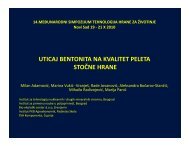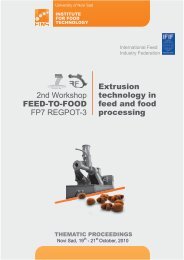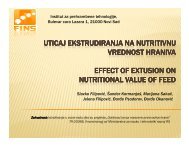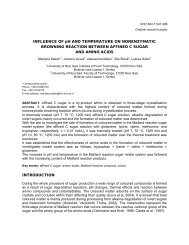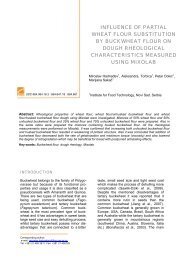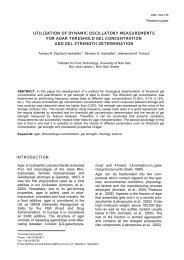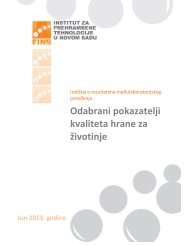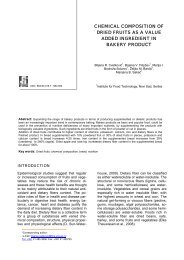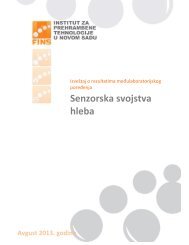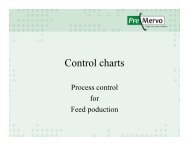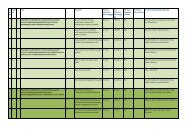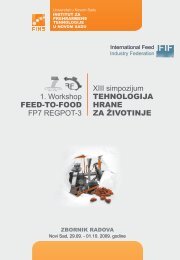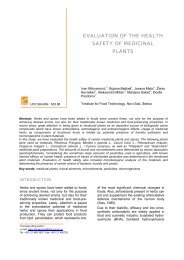- Page 2 and 3:
1 st WorkshopXIII International Fee
- Page 4 and 5:
1 st WorkshopXIII International Fee
- Page 6 and 7:
1 st WorkshopXIII International Fee
- Page 8 and 9:
1 st WorkshopXIII International Fee
- Page 10 and 11:
1 st WorkshopXIII International Fee
- Page 12 and 13:
1 st WorkshopXIII International Fee
- Page 14 and 15:
1 st WorkshopXIII International Fee
- Page 16 and 17:
1 st WorkshopXIII International Fee
- Page 18 and 19:
1 st WorkshopXIII International Fee
- Page 20 and 21:
1 st WorkshopXIII International Fee
- Page 22 and 23:
1 st WorkshopXIII International Fee
- Page 24 and 25:
1 st WorkshopXIII International Fee
- Page 26 and 27:
1 st WorkshopXIII International Fee
- Page 28 and 29:
Digestibility (%)1 st WorkshopXIII
- Page 30 and 31:
1 st WorkshopXIII International Fee
- Page 32 and 33:
1 st WorkshopXIII International Fee
- Page 34 and 35:
1 st WorkshopXIII International Fee
- Page 36 and 37:
1 st WorkshopXIII International Fee
- Page 38 and 39:
1 st WorkshopXIII International Fee
- Page 40 and 41:
1 st WorkshopXIII International Fee
- Page 42 and 43:
1 st WorkshopXIII International Fee
- Page 44 and 45:
1 st WorkshopXIII International Fee
- Page 46 and 47:
1 st WorkshopXIII International Fee
- Page 48 and 49:
1 st WorkshopXIII International Fee
- Page 50 and 51:
1 st WorkshopXIII International Fee
- Page 52 and 53:
1 st WorkshopXIII International Fee
- Page 54 and 55:
1 st WorkshopXIII International Fee
- Page 56 and 57:
1 st WorkshopXIII International Fee
- Page 58 and 59:
1 st WorkshopXIII International Fee
- Page 60 and 61:
1 st WorkshopXIII International Fee
- Page 62 and 63:
1 st WorkshopXIII International Fee
- Page 64 and 65:
1 st WorkshopXIII International Fee
- Page 66 and 67:
1 st WorkshopXIII International Fee
- Page 68 and 69:
1 st WorkshopXIII International Fee
- Page 70 and 71:
Starch disappearance (%)1 st Worksh
- Page 72 and 73:
1 st WorkshopXIII International Fee
- Page 74 and 75:
1 st WorkshopXIII International Fee
- Page 76 and 77:
1 st WorkshopXIII International Fee
- Page 78 and 79:
1 st WorkshopXIII International Fee
- Page 80 and 81:
1 st WorkshopXIII International Fee
- Page 83 and 84:
1 st WorkshopXIII International Fee
- Page 85 and 86:
1 st WorkshopXIII International Fee
- Page 87:
1 st WorkshopXIII International Fee
- Page 90 and 91:
1 st WorkshopXIII International Fee
- Page 92 and 93:
1 st WorkshopXIII International Fee
- Page 94:
1 st WorkshopXIII International Fee
- Page 97 and 98:
1 st WorkshopXIII International Fee
- Page 99 and 100:
1 st WorkshopXIII International Fee
- Page 101 and 102:
1 st WorkshopXIII International Fee
- Page 103 and 104:
1 st WorkshopXIII International Fee
- Page 105 and 106:
1 st WorkshopXIII International Fee
- Page 107 and 108:
X Axis Title1 st WorkshopXIII Inter
- Page 109 and 110:
1 st WorkshopXIII International Fee
- Page 111 and 112:
1 st WorkshopXIII International Fee
- Page 113 and 114:
1 st WorkshopXIII International Fee
- Page 115 and 116:
1 st WorkshopXIII International Fee
- Page 117 and 118:
1 st WorkshopXIII International Fee
- Page 119 and 120:
1 st WorkshopXIII International Fee
- Page 121 and 122:
dehulledhulledFusarium spp.Alternar
- Page 123 and 124:
1 st WorkshopXIII International Fee
- Page 125 and 126:
1 st WorkshopXIII International Fee
- Page 127 and 128:
1 st WorkshopXIII International Fee
- Page 129 and 130:
1 st WorkshopXIII International Fee
- Page 131:
1 st WorkshopXIII International Fee
- Page 134 and 135:
1 st WorkshopXIII International Fee
- Page 136 and 137:
1 st WorkshopXIII International Fee
- Page 138 and 139:
1 st WorkshopXIII International Fee
- Page 140 and 141:
1 st WorkshopXIII International Fee
- Page 142 and 143:
1 st WorkshopXIII International Fee
- Page 144 and 145:
1 st WorkshopXIII International Fee
- Page 146 and 147:
1 st WorkshopXIII International Fee
- Page 148 and 149:
1 st WorkshopXIII International Fee
- Page 150 and 151:
1 st WorkshopXIII International Fee
- Page 152 and 153:
1 st WorkshopXIII International Fee
- Page 154 and 155:
1 st WorkshopXIII International Fee
- Page 156 and 157:
1 st WorkshopXIII International Fee
- Page 158 and 159:
1 st WorkshopXIII International Fee
- Page 160 and 161:
1 st WorkshopXIII International Fee
- Page 162 and 163:
1 st WorkshopXIII International Fee
- Page 164 and 165:
1 st WorkshopXIII International Fee
- Page 166 and 167:
1 st WorkshopXIII International Fee
- Page 168 and 169:
1 st WorkshopXIII International Fee
- Page 170 and 171:
1 st WorkshopXIII International Fee
- Page 172 and 173:
1 st WorkshopXIII International Fee
- Page 174 and 175:
1 st WorkshopXIII International Fee
- Page 176 and 177:
1 st WorkshopXIII International Fee
- Page 178 and 179:
1 st WorkshopXIII International Fee
- Page 180 and 181:
1 st WorkshopXIII International Fee
- Page 182 and 183:
1 st WorkshopXIII International Fee
- Page 184 and 185:
1 st WorkshopXIII International Fee
- Page 186 and 187:
1 st WorkshopXIII International Fee
- Page 188 and 189:
1 st WorkshopXIII International Fee
- Page 190 and 191:
1 st WorkshopXIII International Fee
- Page 192 and 193:
1 st WorkshopXIII International Fee
- Page 194 and 195:
1 st WorkshopXIII International Fee
- Page 196 and 197:
Ash content, %1 st WorkshopXIII Int
- Page 198 and 199:
1 st WorkshopXIII International Fee
- Page 200 and 201:
1 st WorkshopXIII International Fee
- Page 202 and 203:
1 st WorkshopXIII International Fee
- Page 204:
1 st WorkshopXIII International Fee
- Page 207 and 208:
1 st WorkshopXIII International Fee
- Page 209 and 210:
conversion of food (kg)1 st Worksho
- Page 211 and 212:
1 st WorkshopXIII International Fee
- Page 213 and 214:
1 st WorkshopXIII International Fee
- Page 215 and 216:
1 st WorkshopXIII International Fee
- Page 218 and 219:
1 st WorkshopXIII International Fee
- Page 220 and 221:
1 st WorkshopXIII International Fee
- Page 222 and 223:
1 st WorkshopXIII International Fee
- Page 224 and 225:
1 st WorkshopXIII International Fee
- Page 226 and 227:
1 st WorkshopXIII International Fee
- Page 228 and 229:
1 st WorkshopXIII International Fee
- Page 230 and 231:
1 st WorkshopXIII International Fee
- Page 232 and 233:
1 st WorkshopXIII International Fee
- Page 234 and 235:
1 st WorkshopXIII International Fee
- Page 236 and 237:
1 st WorkshopXIII International Fee
- Page 238 and 239:
1 st WorkshopXIII International Fee
- Page 240:
1 st WorkshopXIII International Fee
- Page 243 and 244:
1 st WorkshopXIII International Fee
- Page 245 and 246:
1 st WorkshopXIII International Fee
- Page 247 and 248:
1 st WorkshopXIII International Fee
- Page 249 and 250:
1 st WorkshopXIII International Fee
- Page 251 and 252:
1 st WorkshopXIII International Fee
- Page 253 and 254:
1 st WorkshopXIII International Fee
- Page 255 and 256:
1 st WorkshopXIII International Fee
- Page 257 and 258:
1 st WorkshopXIII International Fee
- Page 259 and 260:
1 st WorkshopXIII International Fee
- Page 261 and 262:
1 st WorkshopXIII International Fee
- Page 263 and 264:
1 st WorkshopXIII International Fee
- Page 265 and 266:
production of fat correctedmilk 3,5
- Page 267 and 268:
1 st WorkshopXIII International Fee
- Page 269 and 270:
1 st WorkshopXIII International Fee
- Page 271 and 272: 1 st WorkshopXIII International Fee
- Page 273 and 274: 1 st WorkshopXIII International Fee
- Page 275 and 276: 1 st WorkshopXIII International Fee
- Page 277 and 278: 1 st WorkshopXIII International Fee
- Page 279 and 280: 1 st WorkshopXIII International Fee
- Page 281 and 282: 1 st WorkshopXIII International Fee
- Page 283 and 284: 1 st WorkshopXIII International Fee
- Page 285 and 286: 1 st WorkshopXIII International Fee
- Page 287 and 288: 1 st WorkshopXIII International Fee
- Page 289 and 290: 1 st WorkshopXIII International Fee
- Page 291 and 292: 1 st WorkshopXIII International Fee
- Page 293 and 294: 1 st WorkshopXIII International Fee
- Page 295 and 296: 1 st WorkshopXIII International Fee
- Page 297 and 298: 1 st WorkshopXIII International Fee
- Page 299 and 300: 1 st WorkshopXIII International Fee
- Page 301 and 302: 1 st WorkshopXIII International Fee
- Page 303 and 304: 1 st WorkshopXIII International Fee
- Page 305 and 306: 1 st WorkshopXIII International Fee
- Page 307 and 308: 1 st WorkshopXIII International Fee
- Page 309 and 310: 1 st WorkshopXIII International Fee
- Page 311 and 312: 1 st WorkshopXIII International Fee
- Page 313 and 314: 1 st WorkshopXIII International Fee
- Page 315 and 316: 1 st WorkshopXIII International Fee
- Page 317 and 318: 1 st WorkshopXIII International Fee
- Page 319 and 320: 1 st WorkshopXIII International Fee
- Page 321: 1 st WorkshopXIII International Fee
- Page 325 and 326: 1 st WorkshopXIII International Fee
- Page 327 and 328: 1 st WorkshopXIII International Fee
- Page 329 and 330: 1 st WorkshopXIII International Fee
- Page 331 and 332: 1 st WorkshopXIII International Fee
- Page 333 and 334: 1 st WorkshopXIII International Fee
- Page 335 and 336: 1 st WorkshopXIII International Fee
- Page 337 and 338: 1 st WorkshopXIII International Fee
- Page 339 and 340: 1 st WorkshopXIII International Fee
- Page 341 and 342: 1 st WorkshopXIII International Fee
- Page 343 and 344: 1 st WorkshopXIII International Fee
- Page 345: 1 st WorkshopXIII International Fee



